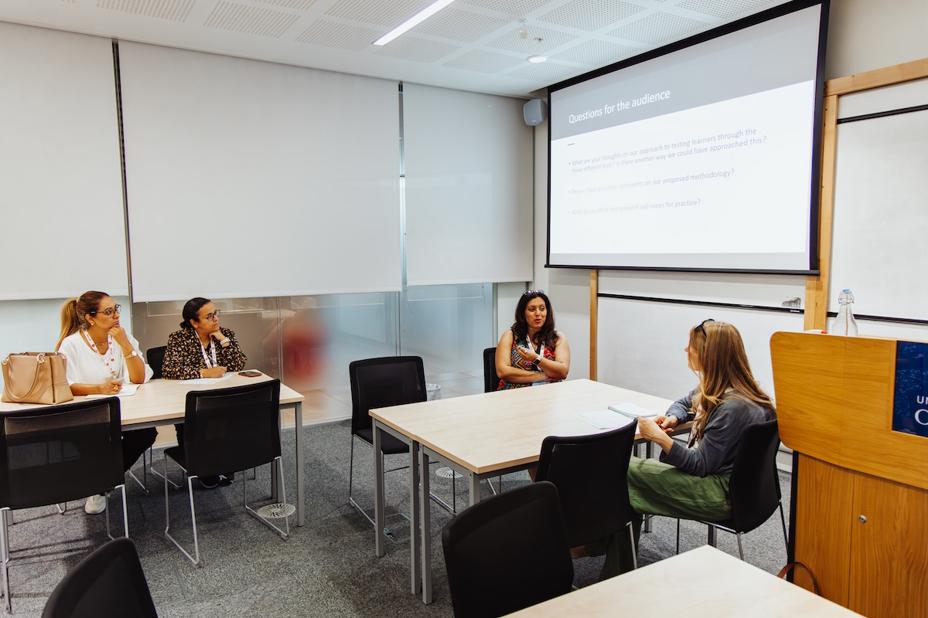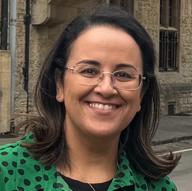
Something went Wrong
Try entering your email again or contact us at support@qfi.org
Try entering your email again or contact us at support@qfi.org
You’ll receive an email with a confirmation link soon.
Sep 3, 2025
By Laila Lamani
The Oxford QFI Research Forum 2025 offered a much-needed space for educators and researchers within the Arabic language teaching community to come together, exchange knowledge, and collaboratively shape the future of the field. As an educator, I left the Forum with a renewed sense of purpose, a deeper appreciation for evidence-informed teaching, and a stronger conviction that research and practice must remain in constant dialogue.
The Forum built on the momentum established in 2024, when the University of Oxford, with support from Qatar Foundation International (QFI), provided a platform where educators and researchers met to build a stronger connection between scholarship and pedagogy in Arabic classrooms.
For teachers, the event demonstrated how research findings can be translated into actionable classroom strategies. For researchers, it revealed the wealth of knowledge embedded in everyday teaching practice. Together, both groups advanced a shared goal: ensuring that Arabic language education continues to thrive in diverse contexts.
This year’s Forum concentrated on three central themes, each of which has important implications for the Arabic teaching community.
I thoroughly enjoyed the panel in which the Country-Level Team leads (from Canada, Ireland, Italy, Sweden, and the United Kingdom) presented preliminary findings from the Study of Arabic Language Programs (SALP), offering a global perspective on how Arabic is taught in schools across different regions. This comparative work helps contextualize the challenges and opportunities faced by Arabic programs worldwide. Although some of these challenges and opportunities are country specific, I believe that the solutions are applicable and useful in other countries.
I am looking forward to the final report and findings of this study, as I strongly believe that it will be essential in improving Arabic programs’ effectiveness.
Another significant highlight was the presentation of a systematic review exploring learner motivation. Motivation remains one of the most powerful predictors of language acquisition success. The updated research database unveiled during the Forum allowed me to better understand what keeps learners engaged and how motivation can be cultivated through instructional design. I appreciated the time we took to look at some case studies that revealed that learners were most motivated when Arabic learning was connected to real-life applications. This was a thought-provoking experience that motivated me to look at opportunities to modify and update the material I use in my teaching to make it more relevant to my students.
A major contribution of the Forum was its emphasis on the ORA database. I find that it is a critical resource for educators and researchers alike. By cataloging and synthesizing AL2 research, this database ensures that findings remain accessible and actionable. I found it to be easy to navigate, and it allows for quick access to research I am interested in reading about.
As the Arabic teaching community continues to grow, I can see how the ORA database will be vital in maintaining a shared knowledge base.
The Forum highlighted the practical value of research when it is contextualized and applied thoughtfully. I believe that these discussions can translate into real-world benefits for the Arabic language teaching community:
In conclusion, the Oxford QFI Research Forum 2025 reaffirmed that research and practice are complementary dimensions of effective Arabic language education. By creating intentional spaces where teachers and researchers can engage in dialogue, the Forum empowered both groups to learn from one another. For educators, the insights gained from systematic reviews, case studies, and cross-cultural program analyses are invaluable. For researchers, the lived experiences of teachers provide the foundation needed to make studies relevant and impactful.
Ultimately, the Forum served as a reminder that the future of Arabic language education depends on the collective efforts and collaboration of all stakeholders. As participants return to their classrooms and research centers, the challenge will be to sustain this momentum, to keep bridging the gap between what research studies teaches us and how we teach our students, so that learners of Arabic everywhere can benefit from the best of both worlds.
Disclaimer: The views and opinions expressed in this blog are those of the author and do not necessarily reflect the views of Qatar Foundation International (QFI). While QFI reviews guest contributions for clarity and to ensure the content is valuable for our audience, the accuracy and completeness of the information are the responsibility of the author.
Submit Your Own Blog!
We invite educators, researchers, and professionals in Arabic education to share their insights with our global community. Whether you teach, conduct research, or support Arabic language learning, your voice can spark innovation, drive change, and deepen understanding in the field of Arabic education.
Laila Lamani teaches Arabic and French to 7th -12th graders at West High School in Salt Lake City, Utah. She holds an M.A in Second Language Acquisition and Teaching and a B.A in political science with a minor in French from Brigham Young University (BYU). Laila was the Utah 2022 Foreign Language Teacher of the Year. She is also her school's Seal of Biliteracy Coordinator.
During her 17 years of teaching for the Salt Lake City School District, she developed the curriculum for the Arabic language program and was part of a team that reviewed and developed the French language program curriculum. Laila has served as president of the Utah Arabic Teachers Association. Her students’ language achievements have been recognized at state, national, and international levels.



